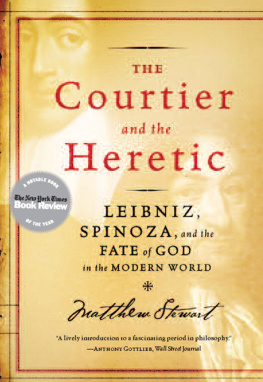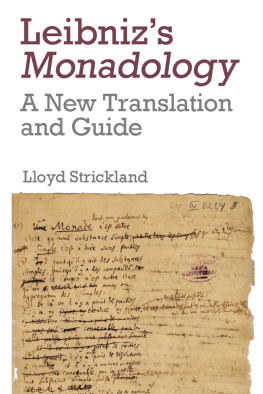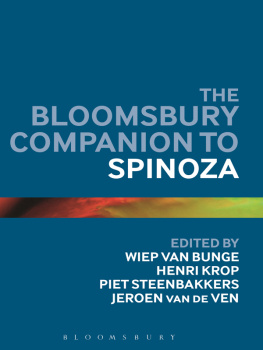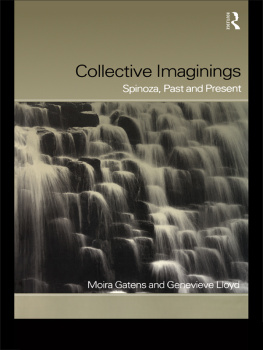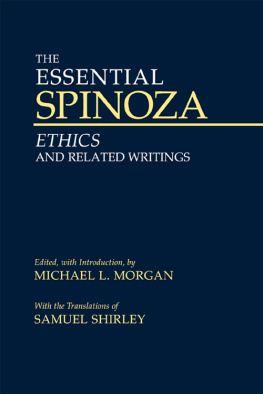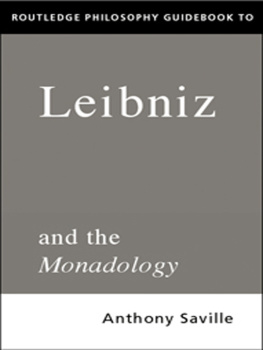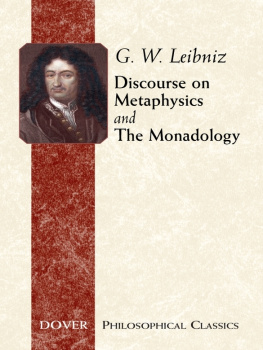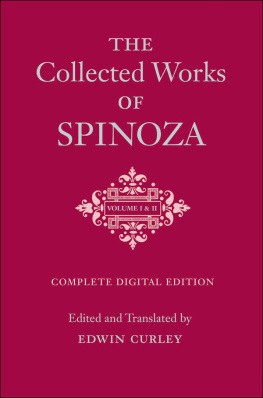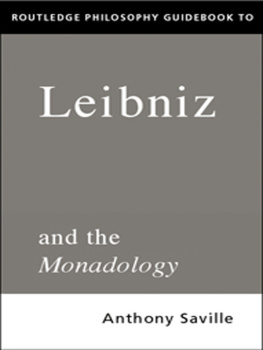Acclaim for The Courtier and the Heretic
A New York Times Book Review Editors Choice A selection of the Book-of-the-Month Club, History Book Club, Readers Subscription, and Quality Paperback Book Club
Because Spinozas doctrines have won acceptance from the architects of the modern world even as Leibnizs traditional religious beliefs have persisted among many who inhabit that world, the drama Stewart recounts will rivet readers skeptical and devout alike.
Bryce Christensen, Booklist
[Stewart] is a fluid, even a jaunty writer, and his summations show fertile wit.
Liesl Schillinger, New York Times Book Review
A most entertaining read about two extraordinary characters, which is both rich in history and overflowing with ideas.
David Edmonds and John Eidinow, authors of Wittgensteins Poker
Altogether excellent. His approach is au courant and quite convincing. He deserves a medal for avoiding jargon and opting instead for accessibility.
Michael Weiss, New York Post
[A] witty, fascinating new book. Following Nietzsches maxim that every great philosophy isa kind of involuntary and unperceived memoir, Stewart deftly intertwines the lives and works of Spinoza and Leibniz and gives an elegant and sometimes hilarious overview of their differences.
Lisa Montanarelli, San Francisco Chronicle
Matthew Stewart has given us an engaging portrait of two of the most important and fascinating thinkers of the modern age and of their complicated relationship. Not only does he make their notoriously difficult ideas accessible, but he does a brilliant job of illuminating for the reader their personal, intellectual, and historical context.
Steven Nadler, author of Rembrandts Jews and Spinoza
Lively and accessible. Stewarts account of the influence of Leibniz and Spinoza on the history of ideas is thoroughly absorbing.
A. C. Grayling, author of What is Good? and Meditations for the Humanist: Ethics for a Secular Age
Stewart goes far to rescue both men from a kind of dusty academic shelf, bringing them to life as enlightened humans displaying the kinds of intellectual and personality differences in which postmodern Westerners delight.
Francisca Goldsmith, Library Journal
Wide-ranging and entertainingsplendid.
Laura Miller, Salon
[A] colorful reinterpretation of the lives and works of 17th-century philosophers Spinoza and LeibnizStewarts wit and profluent prose make this book a fascinating read.
Publishers Weekly , starred review
Stewart has discovered an appealing and novel way to write the history of ideas, and The Courtier and the Heretic isan enlightening, absorbing study.
Adam Kirsch, New York Sun
Stewart makes accessible the many philosophical ideas presented and he brings the men to life. A highly readable examination of two influential, but often overlooked, thinkers of the early Enlightenment.
Kirkus Reviews
Mr. Stewart handles Leibnizs very complex response to Spinoza with dispatch, and impressive lucidity. The Courtier and the Heretic is a very good book, an excellent introduction to the thought and lives of both its subjects.
Washington Times
[An] agile and elegant book.
Globe and Mail
The Courtier and the Heretic
ALSO BY MATTHEW STEWART
Monturiols Dream: The Extraordinary Story of the Submarine Inventor Who Wanted to Save the World
The Truth about Everything:
An Irreverent History of Philosophy with Illustrations
The Courtier and the Heretic
LEIBNIZ, SPINOZA, AND THE FATE OF GOD IN THE MODERN WORLD
Matthew Stewart

W. W. NORTON & COMPANY
NEW YORK LONDON
Copyright 2006 by Matthew Stewart
All rights reserved
For information about permission to reproduce selections from this book, write to Permissions, W.W. Norton & Company, Inc., 500 Fifth Avenue, New York, NY 10110
Production manager: Andrew Marasia
Library of Congress Cataloging-in-Publication Data
Stewart, Matthew, 1963
The courtier and the heretic: Leibniz, Spinoza, and the fate of God in the modern world / Matthew Stewart.1st ed.
p. cm.
Includes bibliographical references.
ISBN: 978-0-393-07104-7
1. Leibniz, Gottfried Wilhelm, Freiherr von, 16461716.
2. Spinoza, Benedictus de, 16321677. 3. GodHistory of doctrines. I. Title.
B2599.G63S74 2006
211dc22
2005019962
W.W. Norton & Company, Inc., 500 Fifth Avenue, New York, N.Y. 10110
www.wwnorton.com
W.W. Norton & Company Ltd., Castle House, 75/76 Wells Street, London W1T 3QT
For Katherine and Sophia
Contents
I t is our good fortune to live in an age when philosophy is thought to be a harmless affair. As the autumn of 1676 approached, however, Baruch de Spinoza had ample reason to fear for his safety. One of his friends had recently been executed, and another had died in prison. His efforts to publish his definitive work, the Ethics , had come to an end amid threats of criminal prosecution. A leading French theologian named him the most impious and the most dangerous man of the century. A powerful bishop denounced him as that insane and evil man, who deserves to be covered with chains and whipped with a rod. To the general public, he was known simply as the atheist Jew.
Among those who seemed eager to bring the infidel philosopher to justice was a young courtier and polymath named Gottfried Wilhelm Leibniz. In a personal letter to that same French theologian, Leibniz described Spinozas work as horrible and terrifying. To a famous professor, he called it intolerably impudent. To a friend he confided, I deplore that a man of such evident culture should have fallen so low.
Yet, in the privacy of his study, Leibniz crammed his notebooks with meticulous commentaries on Spinozas writings. He exchanged secret letters with his public nemesis, addressing him as celebrated doctor and profound philosopher. Through mutual friends he pleaded for a chance to examine a manuscript copy of the Ethics . And, on or around November 18, 1676, he traveled to The Hague and called on Spinoza in person.
LEIBNIZ ARRIVED IN Holland by yacht. He was thirty years old and well on his way to claiming his title as the last universal genius of Europe. He had already discovered the mathematical method we call calculus (later than, but independently of, Isaac Newton). He carried in his luggage his arithmetical calculating machinea small wooden box stuffed with gears and dials that may be counted among the earliest ancestors of the modern computer. He had begun to fill out the long list of his contributions to the fields of chemistry, chronometry, geology, historiography, jurisprudence, linguistics, optics, philosophy, physics, poetry, and political theory. When onecompares ones own small talents with those of a Leibniz, wrote Denis Diderot in the Encyclopdie , one is tempted to throw away ones books and go die peacefully in the depths of some dark corner.
He would have been wearing his trademark wig, an elaborate traveling coat, and the kind of ornate vest, knee-length breeches, and silk stockings that were then the latest fashion in Paris. It is so rare for an intellectual to dress properly, not to smell, and to understand jokes, the Duchess of Orlans noted approvingly. He was of smallish frame, with an unavoidable nose and keen, scrutinizing eyes. He carried his head far forward of his hunched shoulders, and he never knew what to do with his arms. His limbs, it was said, were as crooked and ungainly as those of Charonthe old and sulky ferryman of the dead. As he lurched along the leaf-strewn canals of The Hague, his elaborate robes flapping in the autumn wind, he must have looked like an exotic, gilded bird of prey.

